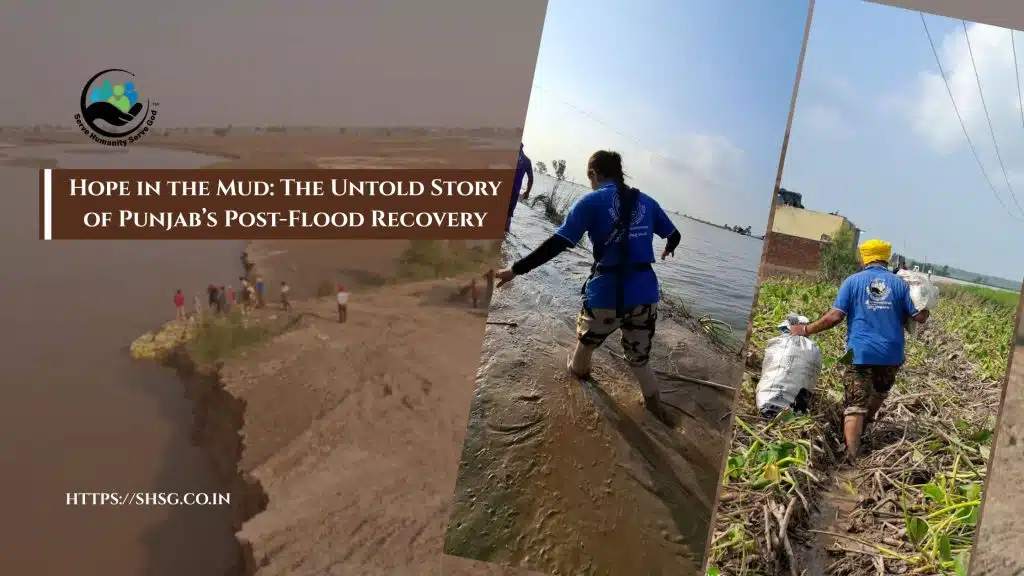
The floods devastated miles of farmland. Crops were lost within days of harvest, irrigation channels failed, and fertile topsoil was washed away. For many families, the disaster represented more than losing; it was losing the basis of their lives and living.
For the farmers in Firozpur and the surrounding districts, they faced the impossible mental dilemma: how does one start over again with nothing left that was not washed away by the water?
Despite the historical odds surrounding their situation, the farmers were dedicated to rebuilding. True to the Punjabi tradition of moral courage, they did not wait until the conditions were ‘perfect’ to begin to rebuild; they made it ‘perfect.’ As soon as the rain ended, the farmers got together to tidy the rubbish, create a balanced soil profile get their fields cultivated again. The field was tilled, but the farm has not changed.
Sowing Seeds of Hope
These days, you can wake up every morning to the sound of tractors moving through the flood-impacted villages once again. The soil feels wet, muddy, and heavy yet was being tilled, slowly, gently, as if bringing an old friend back to life. Farmers are planting seeds of hope in the only ground that previously swallowed their crops.
But it is not an easy ride back. The fields still stand with a cover of silt, and tractors constantly get stuck in the heavy mud. Farmers can spend hours extracting them from the mud, losing precious time and diesel fuel. And diesel is in incredibly short supply.
For so many farmers, right now the biggest challenge is not manpower, capacity and desire. It is diesel. Diesel is the lifeblood of this recovery operation, powering not only tractors, but also water pumps and transportation for relief efforts. Without it, they will be paralyzed in their progress, and without support, their confidence to carry on slips away with each passing hour.
The necessity to donate diesel has never been so pressing. The diesel donated will allow every litre to go directly into rehabilitating the fields of Punjab, allowing farmers again to plow their fields, irrigate their crops are ultimately ensure the livelihoods of many families will return.
What shines in this disaster is the power of seva (selfless service) and community. Local volunteers, NGOs, and humanitarian organizations, including the Serve Humanity Serve God Charitable Trust team, have been engaged on the ground for nearly 45 days.
These groups are assisting in the rehabilitation of damaged houses, feeding livestock, providing essential items, and providing farmers with tools and equipment. Wherever there has been a need and request for assistance, the SHSG team has stepped up to demonstrate that compassion travels quicker than any flooding.
This work is not just an example of relief work; it is a movement of solidarity. People from all walks of life, farmers, truckers, and volunteers have come together to begin rebuilding their villages. They are joining forces to convert despair to fortitude and destruction into cultivation.
Rebuilding Punjab is always more than rebuilding land – it is rebuilding community. The muddy fields of Firozpur are an archive of people who fought back against collapse. Elderly farmers, having lost everything, are outdoors teaching young ones how to start again. Women’s groups are back serving and distributing meals and seeds. Displaced children are back in school thanks to generous locals.
Each act of kindness, no matter how small, is a reaffirmation that Punjabi hearts beat strongest in adversity. The same soil that was drenched in brown water is, once again, being healed back to green – one plough, one seed, and one prayer at a time.
A Call for Diesel
Despite all these fantastic efforts, the barriers are still enormous! There are many tractors that cannot be put to work because they are out of fuel. Farmers lost their livelihood and can no longer afford to buy fuel.
That is why diesel is so important; it’s the foundation of this entire recovery mission. With diesel, farmers can plough fields, run irrigation pumps, and move supplies in villages still affected by the disaster.
The support of the community through diesel, money, and volunteer effort has been what continues this mission onward. Every bit of effort continues to bring us closer to recovery for Punjab.
So, if you can, please contribute some diesel, some of your resources, or at the very least help spread the word. Every little bit helps to make sure that no farmer is left to recover by themselves.
The floods may have tested Punjab’s strength, but they could never wash away its spirit. Across Firozpur and beyond, hope is rising again — not in grand gestures, but in small acts of faith. A farmer restarting his tractor. A volunteer delivering diesel. A child playing beside a field that’s turning green again.
These are the sights and sounds of a land rebuilding itself from the mud.
Punjab’s recovery is not just about crops — it’s about people, pride, and perseverance. The fields may have been silent once, but today, they hum with life, courage, and gratitude.
The story of Punjab’s post-flood recovery is a story of ordinary heroes doing extraordinary things. With every drop of diesel, every helping hand, and every shared meal, we’re not just rebuilding farms — we’re rebuilding futures. Let’s stand with Punjab.
Let’s keep the tractors running, the fields growing, and the hope alive — even in the mud.


